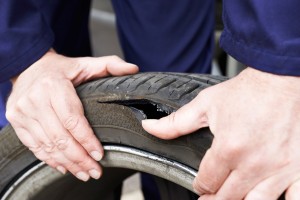A tire blowout is a frightening and sometimes dangerous experience at any speed. Although the number of tire-related accidents has decreased sharply since 2008, the numbers still remain high. Tire related accidents decreased in 2008 because automatic air pressure monitoring systems became a requirement for all vehicles. But the number of accidents remains high: Statistics show that blowouts and flats cause around 11,000 accidents and 200 deaths per year.
Even with advanced technology and safety standards, tire blowouts are still a dangerous situation because many drivers do not know how to handle them. In an instant, a tire blowout can turn a routine drive into a struggle to avoid a wreck. Your reaction to the blowout is vital to staying safe. You have to remain calm and maintain control of the vehicle.
The Sound of a Tire Blowout
The sound can vary by the situation, but there are generally three sounds that you will hear during a blowout: a loud boom of the tire popping, a whoosh of air escaping the tire, and a flapping sound as the tire flops along the road.
How a Blowout Effects Your Car
If you are moving at speed, the car will begin to slow down and pull to the left or right. A front tire blowout will be felt in the steering of the car, while a rear tire blowout will be felt more in the seats or body of the car. Your response should be the same, no matter which tire popped.
Driving Through a Blowout
The National Safety Council and other experts recommend the following steps to safely drive through a blowout:
- Stay in control of the vehicle and keep a firm grip on the steering wheel.
- Don’t slam on the brakes
- Let the vehicle slow down gradually
- Pull over to the side when you are at a safe speed
- Turn on your emergency flashers
After the Blowout
Only exit the vehicle when you are off the road and it is safe to do so. Put out reflective cones or triangles to increase your visibility to other drivers. Call for help if your location prevents you from changing the tire or you do not know how to.
Remember that the spare tire is only meant for emergencies and shouldn’t be used at high speeds or great distances. Read your owner’s manual to learn more about the spare tire. It’s a good idea to know how to change a tire before you hit the road and get stuck somewhere.
Preventing a Tire Blowout
Tire blowouts can be easily prevented by keeping your tires well-maintained. Routinely check your tires for leaks and damage and keep them properly inflated. Remember that tires will lose their air pressure quicker during the summer because of the hot roads. Keeping the load on your vehicle within the manufacturer’s recommendations will also help keep your tires in good shape.
